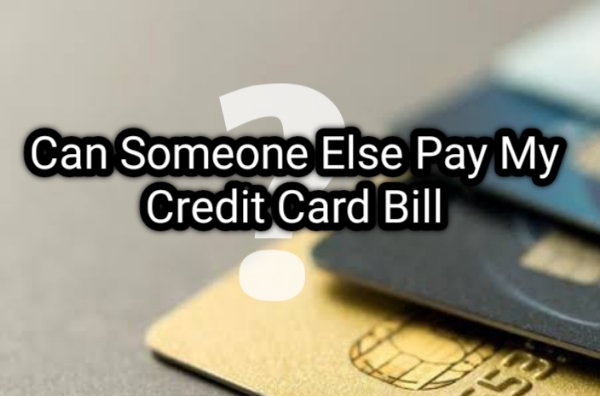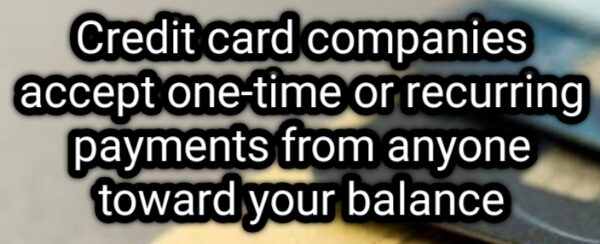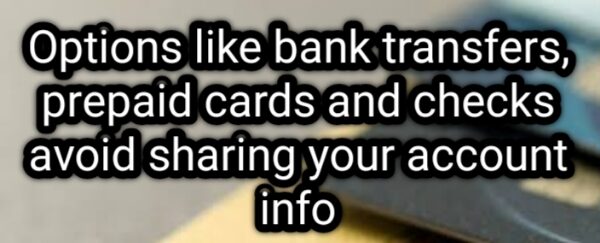Can Someone Else Pay My Credit Card Bill?

When all hope was lost, tears became a daily meal for me, I cried at home, I cried at work. The thought of not being able to meet up with the payment of my debt ate deep into me.
I thought about the worst that could happen and surrendered to fate. My colleague and friend however walked into me moody one day at work and offered to help pay my credit card Bill but I wasn’t sure if someone else could do that so I had to find out.
This article is meant to explore whether it’s possible to have another person pay your credit card balance or not so I carefully read on.

Table of Contents
Why Someone Can Need Help?
It is not new that an increasing number of cardholders struggle to keep up with credit card payments every month.
According to a 2022 report from Experian, the average credit card debt per U.S. household is quite high. With the interest rates also on the rise, balances can quickly become difficult for them to handle.
However those who are lucky might have somebody agree or volunteer to help offset the debt. And that brings us to the question of how possible it is and the options available.
No shame exists asking family, partners, or professional services to assist paying off debts accrued independently – especially when roadblocks like these arise:
- Job Loss or Income Disruption
Covering your credit card minimum payments proves difficult when facing cut work hours or full layoff. So Allowing temporary account management by others offers relief.
- Illness or Incapacitation
A person who Battles health conditions or recovering from procedures leaves little energy left to tackle financial obligations. So getting Assistance helps them ease burdens during convalescence.
- Major Unexpected Expenses
They say that in life, one should always expect the unexpected. Sudden car repairs, medical bills, or emergency travel that may arise needs strain budgets reliant on credit, draining rainy day savings faster.
So when one receives gifts or balance transfers, it saves interest costs in the long run.
- Life Transitions
When one moves, gets divorced, finishes school, or enters into retirement, the shifting incomes warrant rethinking card obligations. Authorized payers would help protect credit until the dust settles.
Rather than jeopardizing your credit scores further through late payments when stretched thin, delegating payment authority helps to shield accounts while you try to adapt finances to changing situations.

Can Someone Else Directly Pay Your Credit Card Company?
Now to the question we’ve all been waiting for, most credit card providers will accept one-time or recurring payments toward your balance from anyone.
So a family member or anyone who decides to help could directly pay your credit card company if you provide them with information like:
- Your Account number
- Your Payment mailing address
- Your account Website login details
However, be aware that the payment will not anonymize their financial details. Their name, bank account and routing number will show up on your account once the payment clears.
While Some people may appreciate the transparency, others may prefer keeping their finances more private.
Security Risks
Now before one does something it is important to know the Implications of your actions, so read the next part carefully.
Giving your account access to anyone else can also pose security risks. They could potentially make unauthorized charges in your name or access your personal data.
So Be cautious of who you trust before sharing login credentials, even with close friends or relatives and Monitor your statements very closely
Getting Started with Account Authorization
When one opts to have another commence payment of their bills, you must take initial steps authorizing access and details surrounding the arrangement. These steps are:
- Formally Approve the Payer
You have to name the specific person(s) or entities permitted managing the credit card account on your behalf by communicating your choices directly to card issuers in writing.

- Share Necessary Card Specifics
You need to Furnish the authorized payers with your credit card account number, legal name attached, billing address etc.
It is essential for properly directing payments online or through money transfer channels.
- Set Payment Expectations Upfront
You’ll have to define your preferred frequency, minimum amounts per payment, total balance reduction goals, and end date expectations before the third parties assume bill responsibilities so that all parties involved can understand the payment plan objectives sought.
- Contract Sign-off If Applicable
For your long term professional credit management services, you need to sign legally binding contracts regarding terms of the debt repayment assistance services providing oversight of your accounts until goals are achieved.
When you successfully Complete these advance directives, it sets clear boundaries and transparency around the unpaid credit card balance assistance being enlisted from outside parties.
Weighing Payment Method Pros and Cons
Once your account authorization formalities is complete, the next step involves selecting the optimal payment method or combination of techniques enabling the new payer choices like:
Online Bill Pay From Bank
Pros:
- They need to Schedule automatic payments avoiding late fees
- Links bank accounts already established
Cons:
- This May however incur transaction fees per payment
- It may cause Delays posting payments by several days
Peer-to-Peer Payment Apps & Mobile Wallets
Pros:
- It has Fast instant transfers that go directly into accounts
- Some may offer cash bonuses for referrals
Cons:
- Caps exist on maximum dollar amounts per transfer
- They Must link recipient’s card or account first
Credit Card Balance Transfers
Pros:
- It gives 0% intro APR pauses interest for 12+ months Cons:
- Your Balance transfer fees apply upfront
- It provides temporary solution still requiring eventual payoff
Added Authorized Card Users
Pros:
- It provides ongoing account privileges with spending flexibility
Cons:
- They Share Access to risks overspending limits
Before completing this process, factor your new payer’s preferences, account compatibilities, and money transfer comfort levels so as to determine the ideal electronic payment method applied toward balances due.
Tax Filing Impacts of Third Party Payments
This is Ofcourse one of the worries of third party payments, while extra money tackling lingering credit card balances proves welcome, it is important to remain mindful of potential tax implications whenever allowing others contributing financially as gifts or debt relief:
Gift Tax Exclusions
The IRS allows individuals receiving up to $16,000 in gifts annually per giver before requiring claim documentation and cumulative excess gift tax payments later.
1099-C Reporting
Even gifters paying your personal debts directly could prompt issuance of 1099-C tax forms recording income if exceeding $600 yearly.
This includes your mortgage, medical bills, student loans or credit card payments sent on your behalf.
So it is advisable to Consult accredited tax specialists to discuss possible exemption eligibility and protocols for reporting any taxable amounts of gifting or debt relief received from third party sources.
Doing so avoids surprises impacting your total income amounts year after year.
When to Carefully Weigh the Risks
While delegating your credit card payments to others may solve short term financial hurdles, also weigh a few inherent risks surrounding lost account control like the following :
Missed Payment Follow-Through
Be aware that Not all voluntary third party payers prove reliable to submitting payments on time each billing cycle. Lapsing commitments risk dings to credit and relationships.
Overspending Card Limits
The Added authorized users may try to exploit your account privileges spending beyond means or intent.
So you need to Closely monitor their activities, this helps avoid nasty surprises.
Loan Default Implications
Seeking qualified credit counselors makes more sense to do rather than relying on unqualified family or friends lacking skills preventing lasting credit damage. Remember that Defaulted accounts severely hurt scores.
Alternative Options for Account Credits
In situations where you or those helping you pay bills prefer more separation, alternatives do exist.
You can still receive funds to put toward the credit card without granting them your account access.
- Bank Transfers
Friends or family who want to help can deposit money directly into your bank account via wire transfer or apps like Venmo, CashApp or PayPal.
You can then transfer the funds yourself into the card’s payment portal instead of sharing your account details with them.
Be aware that bank transfers usually take 1-3 days to clear so Make sure the money arrives in time for making payments by the due date.
Loading a Prepaid Card
Another method available is by using prepaid reloadable cards. Your credit card provider may offer branded versions that work essentially like gift cards. Friends or family could load funds to the card, and you then apply payments from there.
The Green Dot Reload @ the Register Visa is one example that works with Mastercard, Discover and Visa cards. American Express also offers you reloadable prepaid cards.
Mailing a Check
And Of course, one other simple option is to have someone write you a check. All you have to do is Just cash or deposit it and pay your credit card bill.
But Do keep bank transfer timelines in mind, however, so payments post before due dates.
Late fees and interest charges can quickly negate any relief the money would provide.
Which Approach is Best?
There are pros and cons to each approach for allowing others to help pay credit card bills. Consider what matters most to you, weigh your options and choose which is best for you:
Account Access: This is Simplest for one-time payments but you’ll face risks to your security and privacy.
Bank Transfers: This Maintains privacy without sharing personal financial data. But it usually takes 1-3 days for money to clear.
Prepaid Cards: On this, you Let helpers load a set amount monthly, while keeping control of your real credit card. However, the cards often have fees that reduce their value.
Checks: It provides you with No loss of control or privacy. But keep in mind the delayed availability as with bank transfers.
Evaluate both personal preferences, along with each method’s practical application to pick the right solution for you.

Other Important Considerations
If you move forward to receive help with bills, it is important to keep a few additional things in mind:
Agree on terms first: You need to Decide if the helper expects repayment, what schedule works best, etc. So Clarify early to prevent future conflicts.
Prioritize essentials:You can Use any money received to catch up on secured credit lines first, like auto loans or mortgages then Pay off unsecured debt like credit cards last.
Have a backup plan: You need to Understand that contributions may not last forever. So you should Make lifestyle changes to spend less overall as is wise while accepting temporary help.
However, Being on the same page from the start helps maintain positive relationships with your helper even when financial struggles arise.
Open communication and clear expectations pave the way.
Conclusion
Honestly, Having friends or family help pay off credit card bills or other debts can certainly ease financial burdens.
Most card issuers make it relatively simple to receive lump-sum payments toward balances.
You mainly need to weigh preferences around your privacy, security risks, convenience and timing.
In many cases, the easiest approach is also the most direct , that is, allowing a trusted person to login and pay your card issuer directly.
You Just need to be cautious with account access and monitor closely for any unauthorized activity.
However, the Alternatives like bank transfers, prepaid reload cards or checks also get the job done while you succeed in protecting sensitive data.



